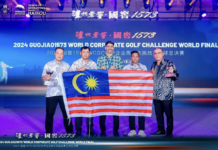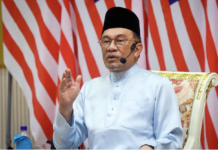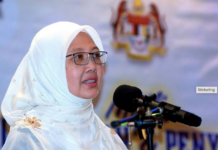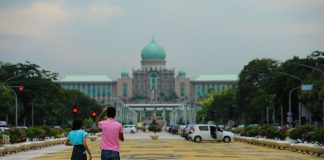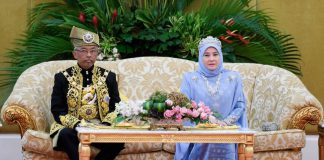KUALA LUMPUR,Mar 18 – DAP Youth chief Howard Lee has called upon his party members to unite behind a progressive message for the party’s upcoming elections, especially as there is a strong possibility that the 15th general election (GE15) is just around the corner.
He told The Vibes that the DAP ballots – which must be held before June this year – would have seen a battle between progressives and conservatives if a federal contest was not breathing down their necks.
“If the general election is far away, if the current (parliamentary) term would see its full exhaustion, (and) there would be a huge clash,” Lee explained.
“But with elections looming – with the posturing of governing parties in civil war, with Umno openly threatening to pull out, and (Prime Minister Tan Sri) Muhyiddin (Yassin) suffering from an electoral emergency – this is generally a reason for the party to unite and minimalise internal differences.”
The Pasir Pinji assemblyman pointed out that the grassroots would be seeking a united front to face their political opponents and, therefore, ideological nitpicking should not be the order of the day.
He believed that with history being made in Perak last year – when DAP cooperated with Umno to oust Bersatu-aligned menteri besar Datuk Seri Ahmad Faizal Azumu – it goes to show that some of the most conservative DAP members can change to a more progressive mindset.
Lee had worked for weeks with factions in Perak Umno and had the blessing of the party leadership to plan and execute the removal of the unpopular Faizal from his position. The Bersatu vice-president was replaced by Umno’s Datuk Saarani Mohamad.
Currently, pundits have observed that there are two schools of thought in DAP.
The first group comprises conservatives who prefer to cater to their traditional power base, who are mainly Chinese. Traditionally, Perak, Johor and Pahang have been considered to be the conservative heartland of DAP, and tend to be rather resistant to change, behaving in an exclusive manner towards some members of the Malay community, preferring their Chinese voter base.
The second faction are party progressives seeking to expand the party’s support structure by courting the voter segments that have always been most resistant towards DAP: rural and conservative Malays.
Some have foreseen a clash between these two factions in the party’s contest. Lee himself is said to be contesting for a post in the central executive committee; this year is his last term as the national Youth chief, and he will be replaced at the wing’s party election at the end of the year.
The MP believes that although the rural Malays’ fear of DAP stems from politically charged xenophobia, the rise of social media has managed to cut through some of the propaganda while relaying their own messages to that particular community.
“You can see that resistance coming down,” he said. “The rise of social media in 2008 was when we started seeing a real increase in rural and semi-urban support.
“We held a DAP urban policy forum and a semi-urban or rural policy forum in Kluang. That was when we started talking about real semi-urban or rural policy issues.”
Rural or semi-urban issues include agricultural, cultural, and religious matters, as well as infrastructure issues.
“These are very complex issues that require you to wait and see when your message is sent across. People think that semi-urban and rural equals lack of sophistication. That’s wrong. Categorically wrong,” he said.
“It’s just a different type of sophistication that may not gain rapport with the urban crowd – but there are intricacies, as in, you have local politics within the kampung of this group versus that (urban) group.”
Furthermore, Lee adds, genuine sincerity in aiding rural communities – including Orang Asli and Orang Asal groups – is critical, not only in relaying the party’s message across these groups, but also for obtaining more voter support.
He pointed out that to win the hearts and minds of voters, DAP must be sincere when approaching these communities, as shown through its action and policies.
The party’s rising star admitted that he always felt uncomfortable with the motive for assisting the Malays, Orang Asli and Orang Asal, which is to obtain their backing at the ballot box.
“While we want to and have to look at the tactical experience and strategic outcome that we are seeking, I think sincerity in helping is very important and, personally, I’ve seen good results from that,” he said.
“When you talk about reaching out to a specific community, I’m always uncomfortable when looking at it purely from a strategic point of view. With outreach, the outcome is twofold: it’s not just about getting our message across, but also about genuinely and sincerely hearing and representing the views that we get as feedback and translating that into action. So, sincerity is of paramount importance.”
At the same time, Lee’s message of inclusion does not stop at race. For him, the party’s leadership must also include non-academic professionals, instead of being top-heavy with only professional elites such as doctors, engineers, accountants and lawyers.
He believes that by including Technical and Vocational Education and Training (TVET) professionals, such as mechanics, tailors, chefs, and other technical workers, DAP can benefit from their various perspectives, giving it greater resilience and adaptability.
“I’m a TVET professional, and I see a huge and grave lack of representation from the TVET sector within our leadership – and when I say leadership, I mean in both the party structure and our elected representatives,” he said.
“There’s nothing wrong with having professional elites, it’s just that you have to be inclusive of the non-elites. I think it’s more of a fact that we need to widen the field in terms of professions.
“That representation isn’t simply just for optics and numbers but for a variety of views, which will translate into resilience of organisation.” – The Vibes






